A six-months online teacher training course entitled “Citizen Science and Environmental Education for Sustainability” was run to introduce citizen science in the Greek school curriculum has recently been completed. The Environmental Education Lab (EEL) of the National and Kapodistrian University of Athens (NKUA) organised, designed and led the training course within the Cos4Cloud framework. There were 23 participants, eleven school teachers and 12 key environmental education officials and teacher training staff at the region of Attica, all very active in environmental and sustainability school-based education practice. The course aimed to introduce citizen science to this core group of Greek educational stakeholders and provide them with theoretical knowledge and practical tools to integrate it into primary and secondary school curricula.
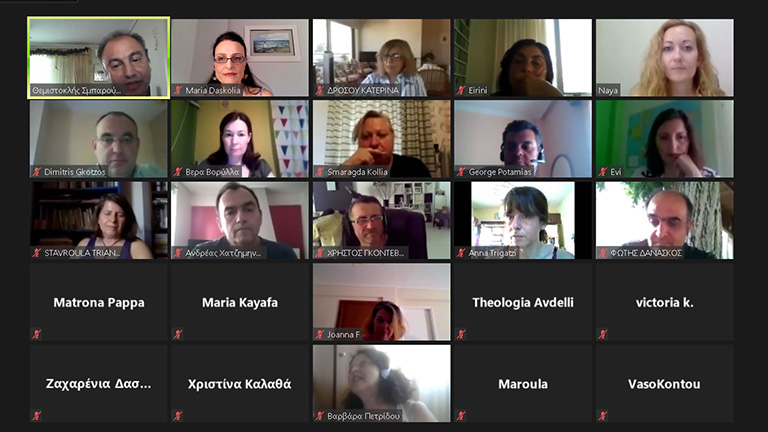
According to the EEL/NKUA team the idea to organize and offer this course to educational stakeholders is that “citizen science is a particularly relevant educational ‘tool’ for engaging students in becoming aware of and contributing to addressing current environmental and sustainability challenges”, says Maria Daskolia, Associate Professor at the National and Kapodistrian University of Athens (NKUA), PI and project manager for the NKUA, and leader of the citizen science integration to Greek schools Task in the Cos4Cloud framework.
Among other things, the participants learned what citizen science is about and why to participate, and how to use citizen science approaches and tools to support and enrich environmental education for sustainability practices. Additionally, they collaboratively designed and elaborated concrete plans (‘educational scenarios’) for how to integrate citizen science in specific school-based EEfS contexts. “We also informed them about what the citizen observatories are and why is it necessary and worthwhile to improve their technology functionalities and capacities in the Cos4Cloud project framework“, says Dimitris Gkotzos, PhD in Educational Sciences and a member of the NKUA research team in the Cos4Cloud project.
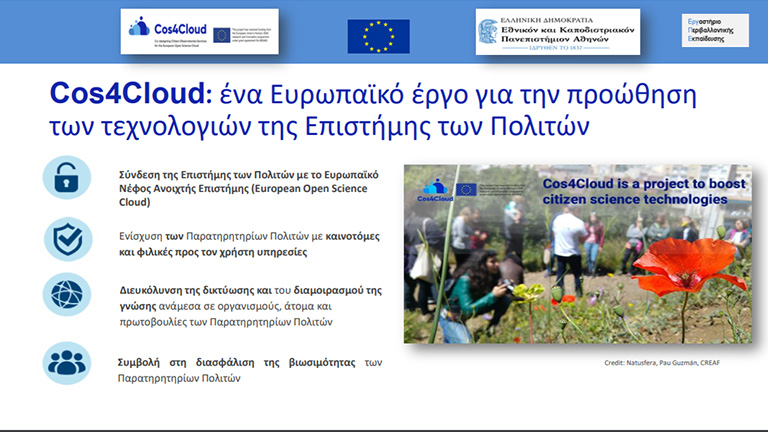
Most of the participants had no previous experience with citizen science at all. Few participants had heard of the idea, although none had personally participated in any citizen science activity or project so far. Nevertheless, after having undertaken the course, all teachers and educational officials expressed a warm interest in the field and their commitment to implementing the educational scenarios they developed into their school(s) and even beyond them.
School-based real cases
During the 2020-2021 school year, most of the course participants did not have the opportunity to apply their educational scenarios with their students in school, because all classes run online, due to the current COVID-19 pandemic conditions. However, some of them attempted and managed to implement part of them.
Identifying plants in school gardens
Christos Gkontevas, a teacher in the 3rd Primary School of Korydallos, engaged 21 6th grade students in a pedagogical activity to identify plants in their school garden with the use of Pl@ntNet. To be able to do so, the students created their personal accounts in Pl@ntNet.
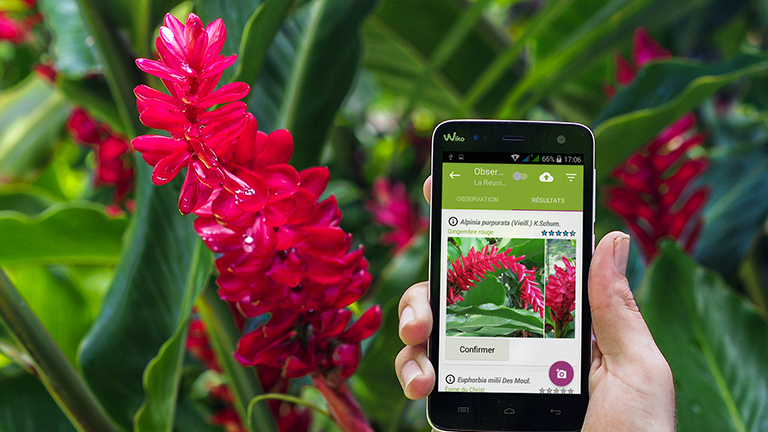
Chasing air pollution with the use of OdourCollect
Anna Trigatzi, a secondary environmental educator, has adapted the original educational scenario she collaboratively designed with two more participants in the course, to engage 21 students at the Senior High School of Metamorfosi with OdourCollect. Moreover, students have also gone through an environmental path to record various ‘odour’ episodes. In March, Anna also collaborated with a colleague teacher from the Junior High School of Krestena (in Peloponnese); they used OdourCollect with 13 3rd grade students in a follow-up activity after reading a literary text about urban odours in Athens city of the 19th century. This activity allowed them to get deeper into the discussion about how odours can provide indications of pollution instances in their city.
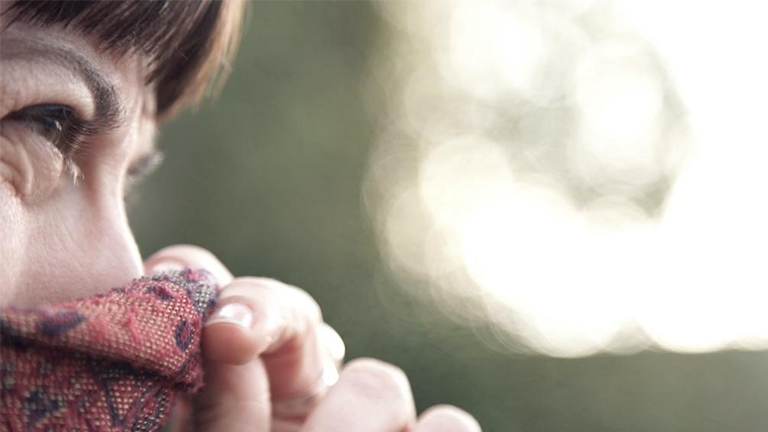
Discovering the local flora
Another environmental education teacher who also participated in the online course, Christina Kalatha, tried out part of the scenario “The magic world of plants as a means for protecting life” sheco-created with two more members of the course, with her students in the 2nd Junior High School of Melissia. In the context of e-learning courses she managed to familiarise students with how to use Pl@ntNet. Students installed the app on their mobile phones and used it during their own nature walks to identify plants and flowers. They uploaded their observations and the photos taken on the platform and exchanged information among them. Christina reported that her students found the application exciting and continue using it in their everyday practice to obtain further information about the flora in their local environments.
Climate change and citizen science
Finally, Ioanna Ntinou, an EEfS educational district coordinator and teacher trainer, has included Pl@ntNet in a proposal for an Erasmus+ Training Course on Youth Workers mobility. The proposal is entitled “SOS Climate” and aims to involve 38 youth workers from Armenia, Bulgaria, Greece, Italy, Lithuania, Poland, Slovakia, Spain, and Turkey. One of the proposed activities focuses on citizen science, and aims to introduce participants on how to use citizen science tools, such as Pl@ntNet in their everyday practice. If approved, the program will be held on 13-19/3/2022.
Throughout the course all participants shared many creative ideas while they collaborated in designing their educational scenarios and activities. “We were so impressed by the enthusiasm expressed by all participants. We are also delighted with their commitment throughout the course, their collaborative spirit, and the quality and innovation of their designs’”, says Evi Kakaroucha, a research assistant at the Environmental Education Lab and one of the course designers of the NKUA team.
The NKUA team also highlights that many participants have expressed a strong sense of ownership and commitment about their scenarios and have already started to spread the word and talk about their personal experience from their participation in the course.
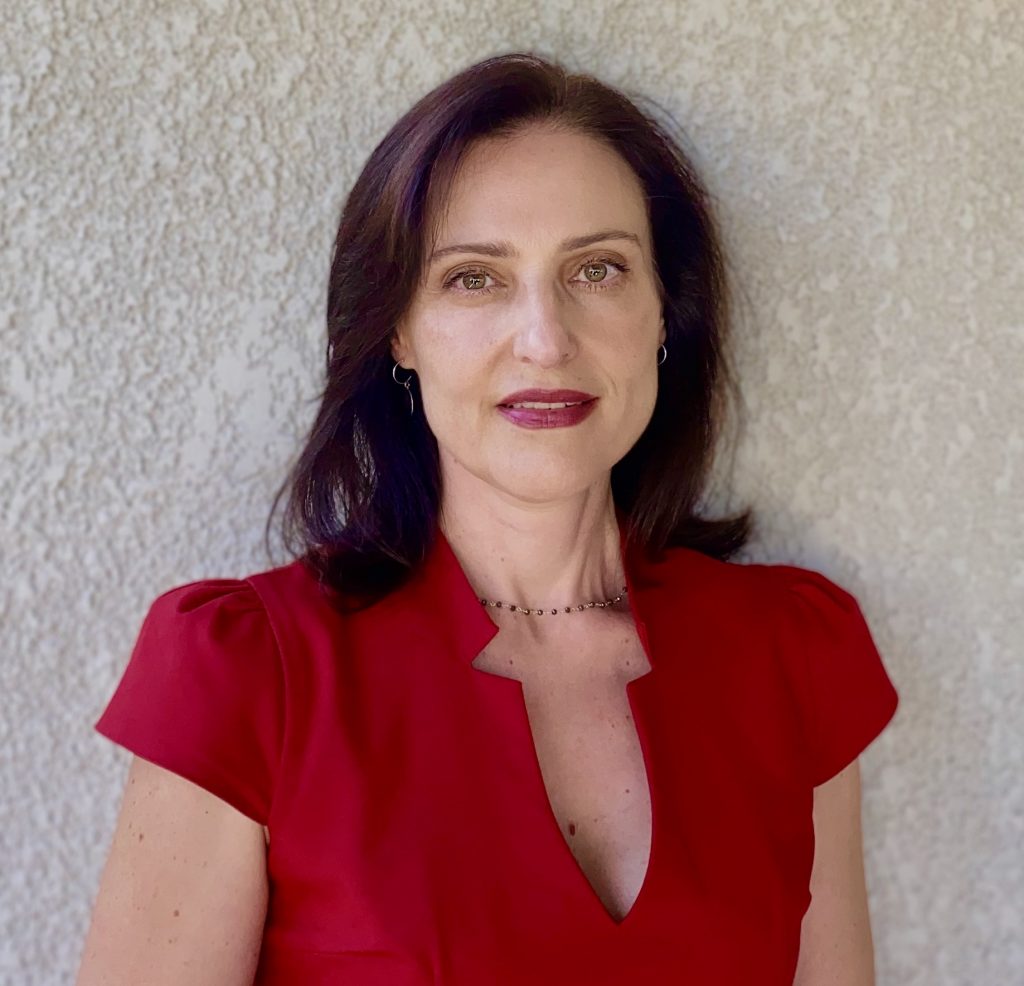
“There is such a promising prospect in all this endeavour; we are very satisfied about how things went and we also see a real potential to come out. The fact that all participants were so positive in evaluating the learning outcomes of the course and declaring that their expectations were met, opens up many opportunities for further collaborations and new plans in the future”, comments Maria Daskolia.
The course was delivered online from July till December 2020 through the Open eClassLMS operated by the NKUA’s Center of Continuing Education and Lifelong Learning. It is structured in five modules: four ‘theoretical’ and one more ‘applied’ and ‘practice-oriented’. As a final task, participants were involved in collaboratively designing educational scenarios and activities with a set challenge to integrate citizen science in school-based primary and secondary schools. To this end, they were introduced to the platforms and apps of the Cos4Cloud COs and were motivated to register in and have a hands-on personal experience of their use. All modules are accompanied by an online self-paced educational material to study, online activities and assignments, and self-evaluation tests, all designed and developed by the EEL/NKUA group. As Maria Daskolia says, “we are willing to share the course material and the scenarios developed with more-than-Greek audiences”.

















